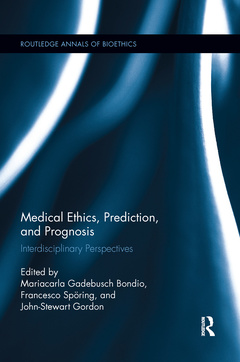Description
Medical Ethics, Prediction, and Prognosis
Interdisciplinary Perspectives
Routledge Annals of Bioethics Series
Coordinators: Bondio Mariacarla Gadebusch, Sporing Francesco, Gordon John-Stewart
Language: English
Subjects for Medical Ethics, Prediction, and Prognosis:
Keywords
Digital Tomosynthesis; Medial Temporal Lobe Atrophy; John-Stewart Gordon; China Disabled Person’s Federation; Francesco Sporing; CSF Aβ; Mariacarla Gadebusch Bondio; Breast Cancer Screening Guidelines; Giovanni Boniolo; CSF Biomarker; Alma Linkeviciute; Incidental Genetic Findings; Giulia Ferretti; Breast Cancer Screening Programs; Christian Lenk; Jeanne Calment; Florian Braune; Predictive Medicine; Heiner Fangerau; Late Onset Diseases; Verena Steinke-Lange; Cervical Cancer; Elke Holinski-Feder; Clinical Practice; Konrad Ott; Preconception Care; Peter Conrad; Genetic Testing; Miranda Waggoner; MCI Subject; Steffen Flessa; Metastatic Breast Cancer; Xian-Ning Zhang; Breast Cancer Screening; Ji Zuo; Prodromal Ad; Stefan F; Lichtenthaler; False Positive Test Results; Simone Lista; EpCAM Positive Cell; Francesco Garaci; Late Onset Neurodegenerative Diseases; Nicola Toschi; Amyloid Pet; Harald Hampel; BRCA Mutation; Agnieszka Pastula; Cancer Cell Line Encyclopedia; medical ethics; individualized medicine; cancer screening; biodata; philosophy of medicine; preventative medicine; bioethics; predisposition; genetic disorders; Alzheimer’s Disease; antidepressants; risk communication; public health systems; health monitoring; health data privacy; right to know; right not to know; Francesco Spöring; Agnieszka Pastuła
Publication date: 06-2020
· 15.2x22.9 cm · Paperback
Publication date: 04-2017
· 15.2x22.9 cm · Hardback
Description
/li>Contents
/li>Readership
/li>Biography
/li>
Recent scientific developments, in particular advances in pharmacogenetics and molecular genetics, have given rise to numerous predictive procedures for detecting predispositions to diseases in patients. This knowledge, however, does not necessarily promise benign results for either patients or health care professionals. The aim of this volume is to analyse issues related to prediction and prognosis as a burgeoning field of medicine, which is revolutionizing the way we understand and approach diagnosis and treatment. Combining epistemic and ethical reflection with medical expertise on contemporary practice and research, an interdisciplinary group of international experts critically examine anticipatory medicine from various perspectives, including history of medicine, bioethics, theories of science, and health economics. The highly complex issues involved in medical prediction call for a far-reaching debate on the value and scope of foreknowledge. For example, which responsibilities and burdens arise when still healthy people learn of their predisposition to diseases? How should health care insurance reflect risky life styles? Is the increasing medicalization of life connected with prevention ethically sustainable and financially possible in the developing world? These and other related issues are the subject of this timely and important book, which not only serves as an introduction to the area, but also proposes many feasible solutions to the problems outlined.
Introduction: Predictive Medicine – An Interdisciplinary Approach
Mariacarla Gadebusch Bondio, Francesco Spöring, and John-Stewart Gordon
Part I. Individual Challenges
1. Beyond the Causes of Disease: Prediction and the Need for a New Philosophy of Medicine
Mariacarla Gadebusch Bondio
2. Comprehending and Communicating Statistics in Breast Cancer Screening. Ethical Implications and Potential Solutions
Giulia Ferretti, Alma Linkeviciute, and Giovanni Boniolo
3. On the Nature of the Right Not to Know
John-Stewart Gordon
4. Predictive Diagnostic Testing for Late-Onset Neurological Diseases in Asymptomatic Minors: ‘Do No Harm’ and the Value of Knowledge
Heiner Fangerau, Florian Braune, and Christian Lenk
5. Incidental Findings in Genetic Testing
Elke Holinski-Feder and Verena Steinke-Lange
Part II. Social Challenges
6. Risk and Solidarity within Individualized Medicine
Konrad Ott
7. Anticipatory Medicalization: Predisposition, Prediction, and Proto-Disease, Expanding Medicalized Conditions
Peter Conrad and Miranda Waggoner
8. Predicting the Cost of Diseases in Resource-Poor Countries
Steffen Flessa
9. Genetic Disorders in Chinese Patients and Their Families: A Call for Action on Predictive Medicine
Xian-Ning Zhang and Ji Zuo
Part III. Research Challenges
10. Personalized Antidepressant Prescription: A Historical Perspective on Risks and Opportunities
Francesco Spöring
11. Predicting, Preventing, and Treating Alzheimer’s Disease: Current State and Future Challenges
Stefan F. Lichtenthaler
12. Early Detection, Prediction, and Prognosis of Alzheimer’s Disease
Simone Lista, Francesco Garaci, Nicola Toschi, and Harald Hampel
13. Immunoscore, Circulating Tumor Cells and Human-Derived Organoids as Potential Predictive Tools in Personalized Cancer Medicine
Agnieszka Pastuła
Mariacarla Gadebusch Bondio is Professor in the Institute for History and Ethics of Medicine at Technical University of Munich, Germany
Francesco Spöring is Research Assistant in the Institute for History and Ethics of Medicine at Technical University of Munich, Germany
John-Stewart Gordon is Professor of Philosophy and Head of the Applied Ethics Research Group at Vytautas Magnus University, Lithuania
These books may interest you

Ethics and Error in Medicine 48.88 €

Ethics and Error in Medicine 160.25 €

